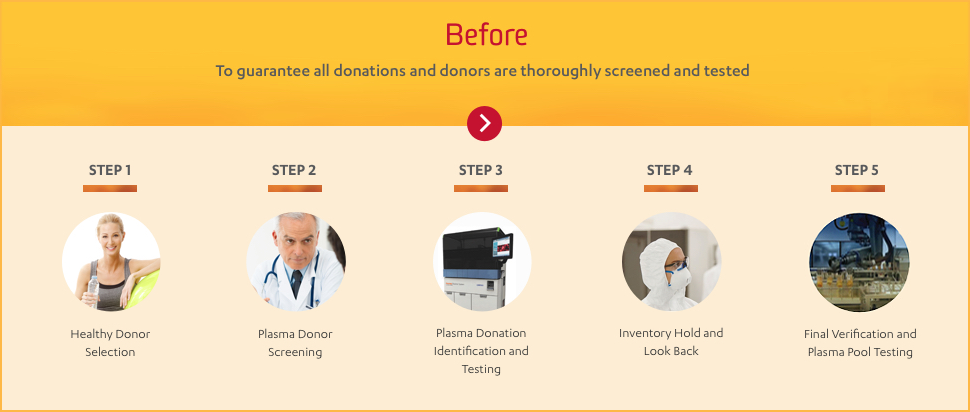Plasma donation and collection
Grifols is focused on quality and safety even before ALPHANATE manufacturing begins
Each potential plasma donor must pass 2 initial medical exams and must make 2 separate plasma donations (within a 6-month period) that must undergo rigorous testing for transmissible diseases. In addition, donors must pass a health screening at each visit. Each unit of plasma is tested after collection using FDA protocols to verify the donor's health status and determine the safety of the collected plasma. Finally, all donors' health is continually monitored via an annual physical exam.

The world's largest plasma collection network
Grifols, the manufacturer of ALPHANATE, owns and operates the world's largest plasma collection network:
- All plasma used in the manufacturing of Grifols products comes from a network of more than 300 FDA-licensed and -regulated plasma donation centers in the United States
- Average 45,000 donations daily across the US*
- Three state-of-the-art plasma testing labs in the US*
- The Grifols Academy of Plasmapheresis continuously trains Grifols staff
All of the plasma used to manufacture ALPHANATE is collected in more than 300 FDA-licensed and -regulated plasma donation centers. As part of our commitment to safety throughout this collection process, Grifols provides full traceability of plasma from donor to patient.
Indication
ALPHANATE® (antihemophilic factor/von Willebrand factor complex [human]) is indicated for:
- Control and prevention of bleeding episodes and perioperative management in adult and pediatric patients with factor VIII (FVIII) deficiency due to hemophilia A.
- Surgical and/or invasive procedures in adult and pediatric patients with von Willebrand disease (VWD) in whom desmopressin (DDAVP) is either ineffective or contraindicated. It is not indicated for patients with severe VWD (type 3) undergoing major surgery.
Important Safety Information
ALPHANATE is contraindicated in patients who have manifested life-threatening immediate hypersensitivity reactions, including anaphylaxis, to the product or its components.
Anaphylaxis and severe hypersensitivity reactions are possible with ALPHANATE. Discontinue use of ALPHANATE if hypersensitivity symptoms occur, and initiate appropriate treatment.
Development of procoagulant activity-neutralizing antibodies (inhibitors) has been detected in patients receiving FVIII-containing products. Carefully monitor patients treated with AHF products for the development of FVIII inhibitors by appropriate clinical observations and laboratory tests.
Thromboembolic events have been reported with AHF/VWF complex (human) in VWD patients, especially in the setting of known risk factors.
Intravascular hemolysis may occur with infusion of large doses of AHF/VWF complex (human).
Rapid administration of a FVIII concentrate may result in vasomotor reactions.
Because ALPHANATE is made from human plasma, it may carry a risk of transmitting infectious agents, eg, viruses, the variant Creutzfeldt-Jakob disease (vCJD) agent, and, theoretically, the Creutzfeldt-Jakob disease (CJD) agent, despite steps designed to reduce this risk.
Monitor for development of FVIII and VWF inhibitors. Perform appropriate assays to determine if FVIII and/or VWF inhibitor(s) are present if bleeding is not controlled with expected dose of ALPHANATE.
The most frequent adverse drug reactions reported with ALPHANATE in >1% of infusions were pruritus, headache, back pain, paresthesia, respiratory distress, facial edema, pain, rash, and chills.
Please see full Prescribing Information for ALPHANATE.
You are encouraged to report negative side effects of prescription drugs to the FDA. Visit www.fda.gov/medwatch or call 1.800.FDA.1088.


